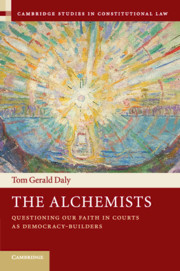Description
The Alchemists
Questioning our Faith in Courts as Democracy-Builders
Cambridge Studies in Constitutional Law Series
Author: Daly Tom Gerald
This book presents a searching critique of excessive reliance on courts as 'democracy-builders' in states emerging from authoritarian rule.
Language: English
Subject for The Alchemists:
Approximative price 38.06 €
In Print (Delivery period: 14 days).
Add to cart
The Alchemists
Publication date: 12-2018
Support: Print on demand
Publication date: 12-2018
Support: Print on demand
Approximative price 142.56 €
In Print (Delivery period: 14 days).
Add to cart
The Alchemists
Publication date: 11-2017
390 p. · 15.8x23.5 cm · Hardback
Publication date: 11-2017
390 p. · 15.8x23.5 cm · Hardback
Description
/li>Contents
/li>Biography
/li>
Can courts really build democracy in a state emerging from authoritarian rule? This book presents a searching critique of the contemporary global model of democracy-building for post-authoritarian states, arguing that it places excessive reliance on courts. Since 1945, both constitutional courts and international human rights courts have been increasingly perceived as alchemists, capable of transmuting the base materials of a nascent democracy into the gold of a functioning democratic system. By charting the development of this model, and critically analysing the evidence and claims for courts as democracy-builders, this book argues that the decades-long trend toward ever greater reliance on courts is based as much on faith as fact, and can often be counter-productive. Offering a sustained corrective to unrealistic perceptions of courts as democracy-builders, the book points the way toward a much needed rethinking of democracy-building models and a re-evaluation of how we employ courts in this role.
Preface: our court obsession; Acknowledgments; Table of cases; List of abbreviations; Introduction: an onerous role for courts as democracy-builders; 1. The core concept: democratisation; 2. The rise and limits of constitutional courts as democracy-builders; 3. The rise and limits of human rights courts as democracy-builders; 4. 'Democratisation jurisprudence': framing courts' democracy-building roles; 5. Domestic democratisation jurisprudence in action: Brazil since 1988; 6. Regional democratisation jurisprudence: shaping democracy from outside; 7. What should courts do in a young democracy? Rethinking our approach; Concluding thoughts: moving beyond our court obsession; Bibliography; Index.
Tom Gerald Daly is a Fellow of Melbourne Law School, Associate Director of the Edinburgh Centre for Constitutional Law at Edinburgh Law School, and a consultant on public law, human rights, and democracy-building. He has previously clerked for the Chief Justice of Ireland, and has worked at the Judicial Studies Institute and Edinburgh University's Global Justice Academy. As a consultant, he has worked on Council of Europe, European Union, International IDEA (Institute for Democracy and Electoral Assistance), and Irish government projects.
© 2024 LAVOISIER S.A.S.




